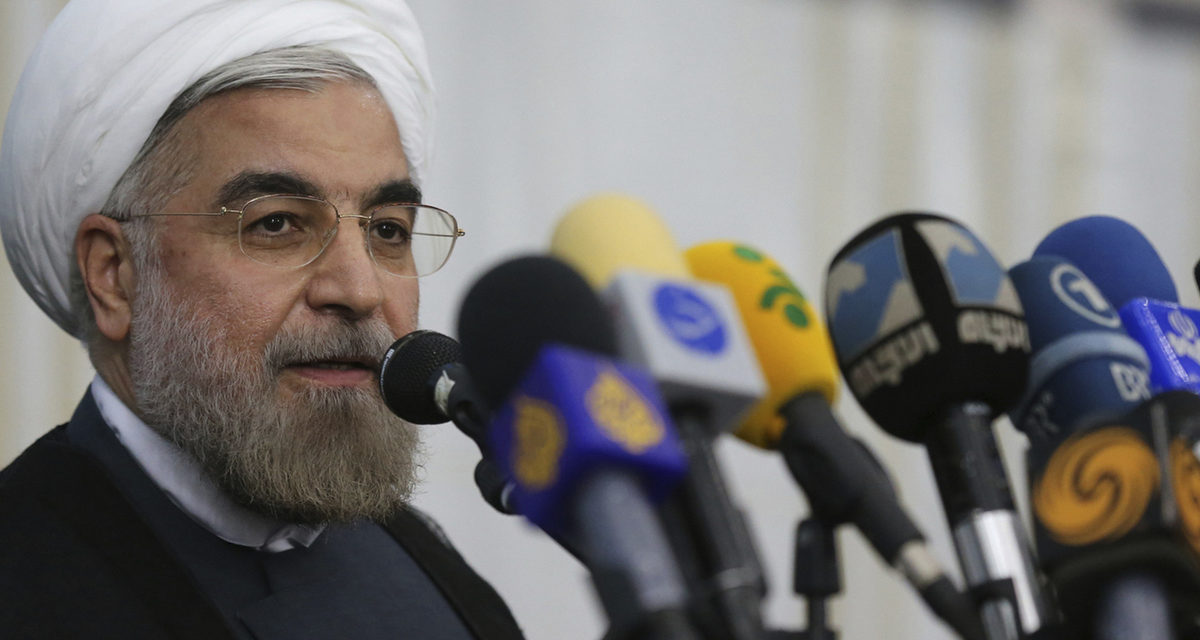LATEST: US Official: Iran Oil Revenues Down 58% since 2011
In contrast to days of heated propaganda from Iran, warning that airstrikes on Syria will bring “fire” upon Israel and lead to defeat for the US and its allies, President Rouhani continues to avoid the rhetoric of confrontation while warning against military intervention.
The President’s office said via Twitter that Rouhani had agreed with Russian counterpart Vladimir Putin that “any use of military force against another country without a UN mandate was a blatant violation of international law” and that the Syrian conflict can “be resolved only through diplomatic means”. The office emphasized the warning that US-led airstrikes “could destabilize entire region, breeding extremism and terrorism” with the hashtag “#prudence”.
Rouhani’s mentor, former President Hashemi Rafsanjani, bolstered the line on Thursday by urging “leaders of powerful countries” to resolve the situation with dialogue, rather than military force.
Like Rouhani, Rafsanjani invoked the example of Iraq’s use of chemical weapons against Iran in their war in the 1980s to condemn their deployment and the mass killing of civilians.
US Official: Iran Oil Revenues Down 58% since 2011
A “senior US official” has said that Iran’s monthly revenues from oil sales have dropped 58% since 2011 amid US-led sanctions.
The official said Tehran’s oil revenues averaged an estimated $3.4 billion in the first half of 2013, down from $6.3 billion in same period in 2012, and $8 billion from January to June 2011.
The senior U.S. official said about $1.5 billion in Tehran’s oil revenues have piled up in foreign accounts, money that Iran has difficulty accessing.
Iran is only able to use the bulk of its currency reserves for bilateral trade with a handful of countries that import Iranian oil: China, South Korea, Japan, Turkey, and India, according to the source.
Tehran’s oil exports fell from about 2.2 million barrels per day at the end of 2011 to as low as 780,000 bpd this year. In July, the Islamic Republic sold 1.16 million bpd.
Syria Rhetoric Roundup
In contrast to the message of “prudence” issued by President Rouhani’s office, a number of prominent political and military figures have taken a more defiant line in response to the prospect of US intervention in Syria by criticising Washington and warning of the wider repercussions of an American attack.
On Thursday Ali Larijani, speaker of majlis, accused the United States of pre-planning a military intervention in Syria.
He stated, “The issue of [military] action against Syria is not an issue which the US has devised in recent days.”
Meanwhile, Hossein Naqavi Hosseini, spokesman for the National Security and Foreign Policy Committee of Iran’s Majlis, has echoed the defiant tone coming from elements within the Islamic Republic, claiming that any attack on Syria will rebound on Israel.
Hosseini declared that “Syria has enough capability to respond to [military] attacks on its own, and if the US fires a missile into Syria, it will receive its response in Tel Aviv.”
Defense Minister Brigadier General Hossein Dehqan took a similar but less hyperbolic response, stating that “Basically, not only will the use of force and violence fail to relieve tensions but will also intensify the crisis and cause it to spread to other political entities.”
He warned, “The real losers of any war in the region will be those who initiate it.”
Chief of Staff of the Iranian Armed Forces General Hassan Firouzabadi also warned the United States against intervening, so as to avoid further bloodshed, while Mohammad Hassan Asafari, member of the majlis National Security and Foreign Policy Commission, likened Washington’s Syria policy to its policy regarding alleged Iraqi WMDs ten years ago.
Foreign Minister Mohammad Javad Zarif’s response to the developments will be dealt with in a separate post.

